Standing majestically at 4,095 Meters (13,435 feet), Mount Kinabalu is the highest mountain of Malaysia. Mt. Kinabalu derives its name from the Kadazan word, Aki Nabalu, meaning ‘the revered place of the dead’. It is one of the most conquerable peaks in the world. This guide will help you to reach the summit of Mount Kinabalu, with some info that travel agents don’t want you to know.
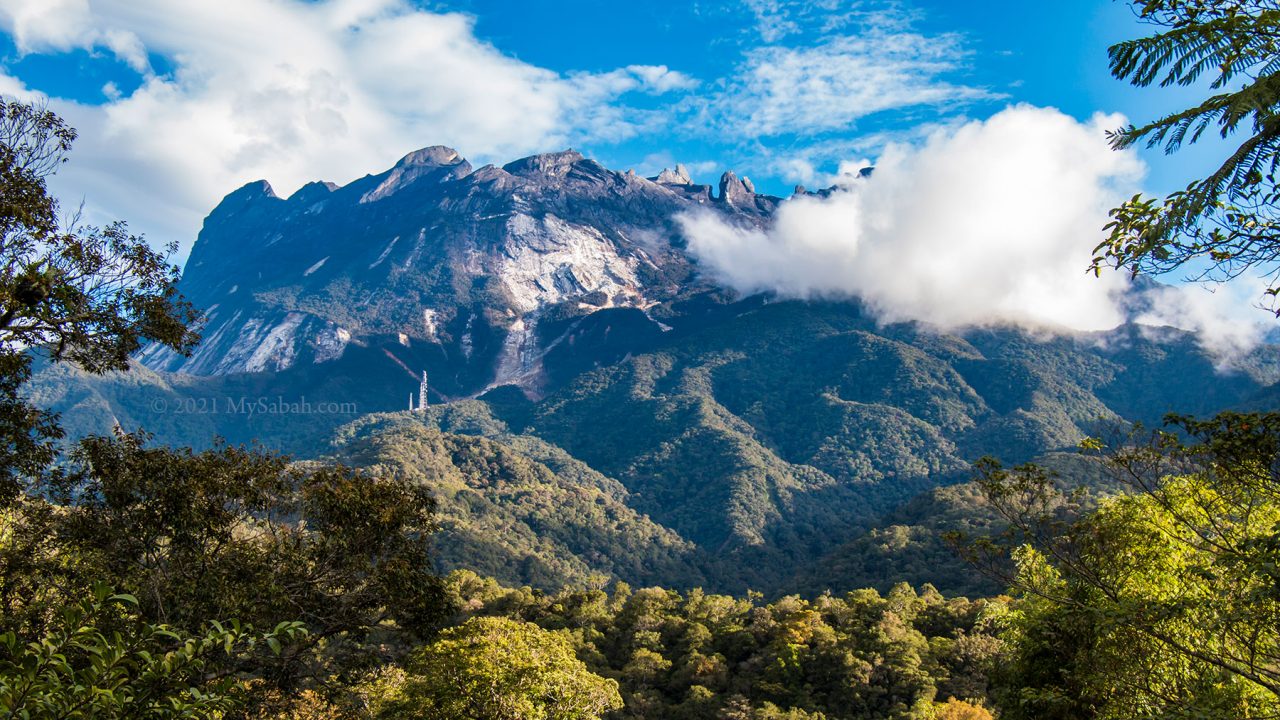
- The maximum number of climbers (daily quota) is 165 climbers per day.
- Climb Permit fee is now RM400 for foreigner; RM100 for Malaysian. Half price if the climber is below 18 years old.
- Child under 16 must be accompanied by a dedicated Mountain Guide. Each Mountain Guide can only take up to 2 children (or up to 5 adult climbers).
- Mountain Guide who takes care of children will not guide adult climber. For example, if your group has 3 adult and a child (below 16) climbers, you must hire two mountain guides (one to take care of adults, another one for child only).
- The rate of mountain guide service (mandatory) is RM350.
- Porter service (optional) costs RM14 per Kilogram (Kg).
- You may follow the Facebook of Sabah Parks for latest news and promotion.
Mount Kinabalu’s specialty lies in its location at a renowned World Heritage Site – Kinabalu Park. Nature lovers will be delighted to be able to witness the many variations of flora and fauna that are to be found on the mountain at different altitudes.
1. How much does it cost?
Quick Answer: The lowest budget for climbing Mount Kinabalu is about RM1,019 (≈USD237) for Non-Malaysian Tourist and RM444 for Malaysian (Based on the rates of year 2023, for adult climber who shares guide fee with others). The cost includes accommodation (at Panalaban), meals, shared mountain guide fee, conservation fee, climb permit, and insurance. Please download the Excel file to see the itemized budget.
- The Best Time to climb Mt. Kinabalu is between March and August, which are the dry seasons of Sabah. The peak season is Apr to Jun.
- You can climb in other months, but try to avoid Dec and Jan, which are the wettest months, due to the North-East Monsoon
- The mountain accommodation area (known as Panalaban), where Laban Rata Rest House and hostels located, is 2.72 KM before the summit of Mt. Kinabalu. Most climbers overnight here before conquering Mt. Kinabalu in next morning.
- If you are not allowed to climb to the summit of Mt. Kinabalu due to bad weather, there is No Refund.
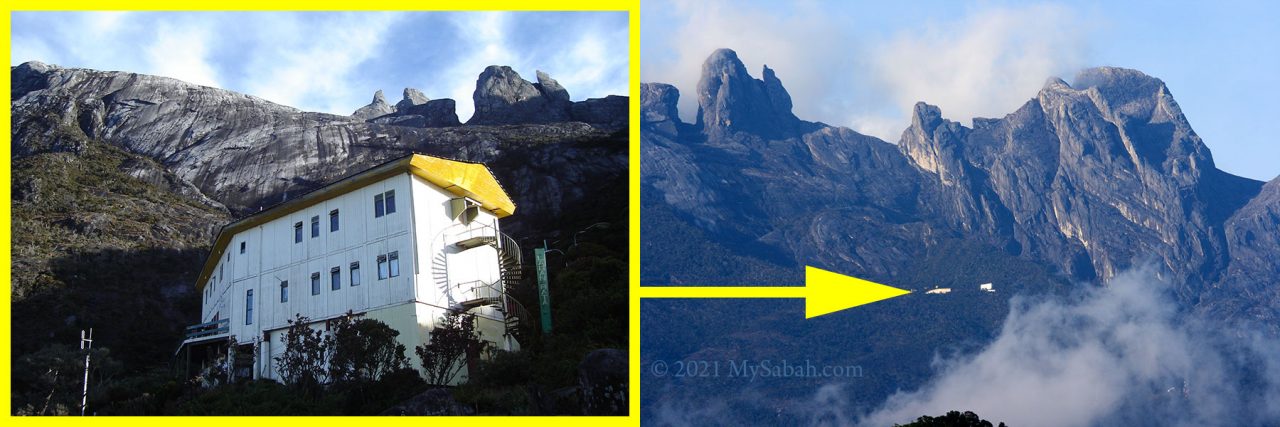
How to Book a Climb Package
Booking the one-night Accommodation at Panalaban (formerly Laban Rata) is the FIRST step. You can’t climb Mt. Kinabalu if you haven’t reserved any room on the mountain. Camping on the mountain is not allowed.
Important notes:
- You must book at least 6 months in advance. The park allows only 80 climbers to climb per day, due to conservation and limited rooms, so the accommodation is always fully booked.
- Never, I repeat, never book with any individual who claims that he is a guide and can offer you very low price. Many tourists have been scammed and lost their money. Only book with licensed travel agents and legitimate operators (i.e. Sutera Sanctuary Lodge and Sabah Parks).
- Conquering Mt. Kinabalu requires only 2 days 1 night.
- However, to let climbers to get used to high altitude, Sutera Sanctuary Lodges (management of Laban Rata Resthouse) usually sells you 3-day-2-night accommodation (with 1 extra night at Kinabalu Park, foothill of Mt. Kinabalu).
- The cheaper accommodations, Panar Laban Hut, Waras Hut, Panalaban Hostels and Lemaing Hostel are next to Laban Rata Resthouse.
- All accommodation package is inclusive of full meals (buffet style).
There are four ways to book the climb package:
1. Book with Travel Agent
If you can afford, just book the tour package with licensed tour agents of Sabah. Though you will pay more, they will take care of everything, from transportation, registration, to the end of climb. This is the Best option.
2. Book with Sabah Parks
Next to Laban Rata Resthouse, Lemaing Hostel and Panalaban Hostels are new (and cheaper) accommodation available to climbers. Lemaing Hostel is only open to Malaysian climbers, and Panalaban Hostels is open to both Malaysian and international climbers. You can book the accommodation directly with Sabah Parks, the management of these hostels. Please note you need to to pay other mandatory fees such as climb permit, insurance and guide fee, besides the meals and accommodation there.
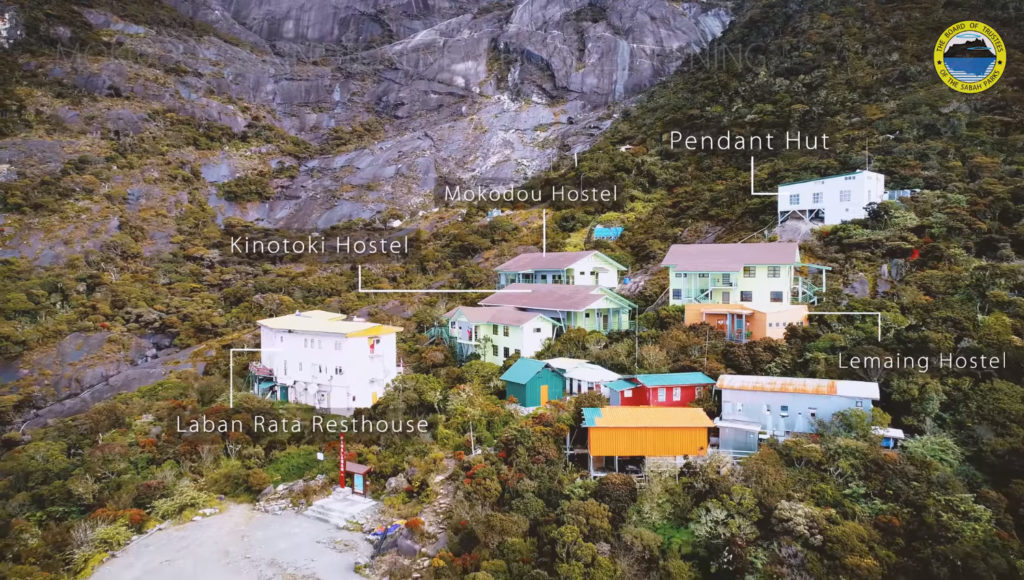
A) Lemaing Hostel (for Malaysian only)
Open in 2014, this hostel has 75 bunk beds . (RM is Malaysian Ringgit (MYR). USD1.00 can exchange about RM4.20)
Accommodation & Meals: RM340
Insurance: RM10
Climb Permit: RM100 (adult), RM50 (below 18)
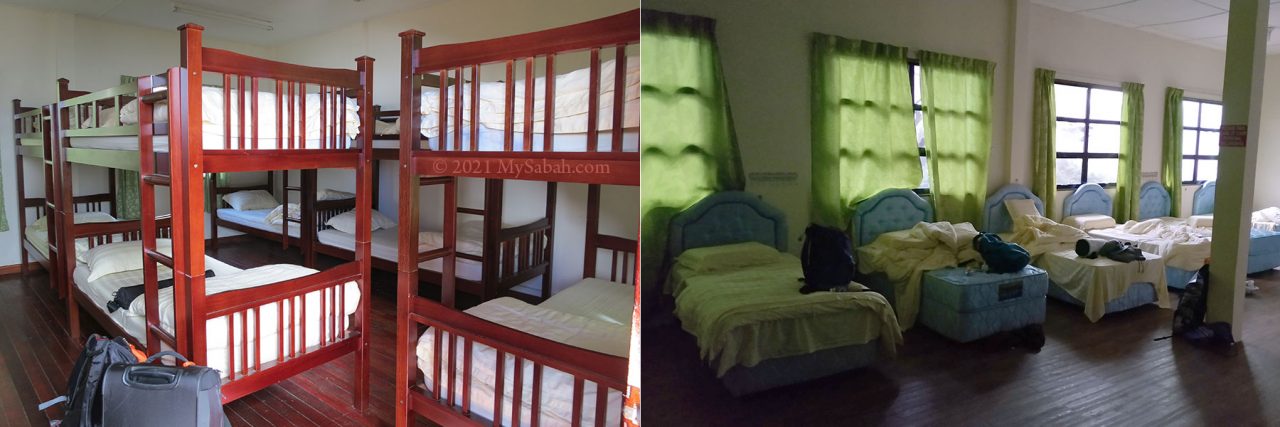
B) Panalaban Hostels (for Malaysian and Foreigner)
Open in 2019, Panalaban Hostels (Kinotoki and Mokodou) can accommodate 50 climbers.
Accommodation & Meals: RM430
Insurance: RM10
Climb Permit: (Malaysian rate) RM100 (adult), RM50 (below 18); (Foreigner Rate) RM400 (adult), RM200 (below 18)
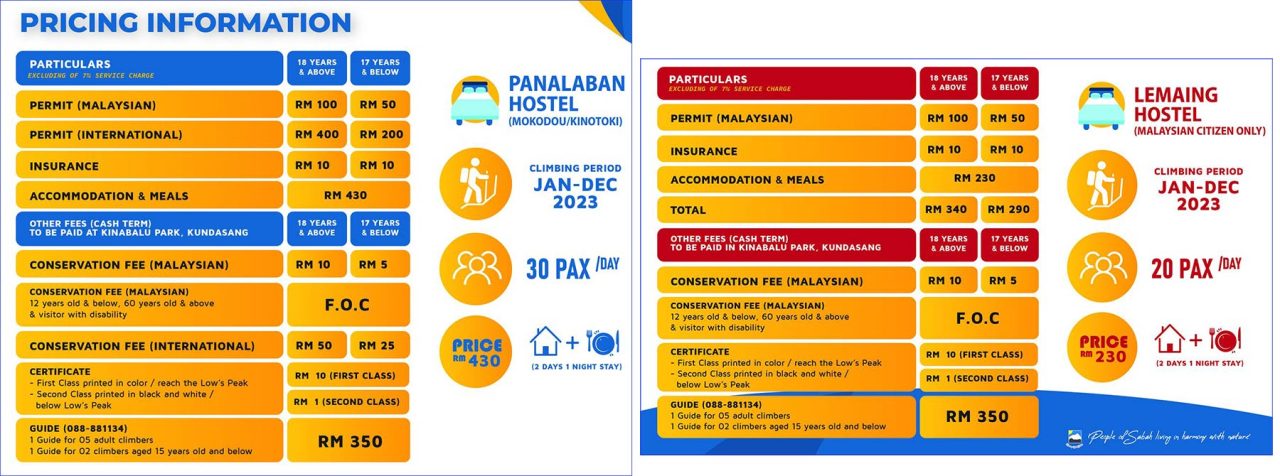
Sabah Parks Contact:
You can book the package online, or visit Sabah Parks office located in KK Times Square (Kota Kinabalu City) to book a room and make payment:
Online Booking: reservation.sabahparks.org.my
Office Hours: 8:00AM – 5:00PM, Mon-Fri (closed on Sat, Sun & Public Holiday)
Phone: +60 88-523531 / +60 88-523572
E-mail: sabapak.eco@sabahparks.org.my
Website: www.sabahparks.org.my
Facebook: SabapakEco

3. Book with Sutera Sanctuary Lodges (SSL)
SSL is the management of accommodation in Kinabalu Park and Laban Rata Resthouse. For booking, you can contact them at:
E-mail: info@suterasanctuarylodges.com.my
Tel: +60 88 308 914 / 308 915 / 308 916
Website: www.suterasanctuarylodges.com.my
Facebook: SuteraSanctuary
Address: B-G-9, Block B, Ground Floor, Sutera Avenue, Lorong Lebuh Sutera, Kota Kinabalu, Malaysia. (see location map)
Business Hours: 9am-5pm (Mon-Fri), 9am-1pm (Sat), close on Sun & Public Holiday
Online Booking is available in website of Sutera Sanctuary Lodges. You may drop by the office of SSL, which is located in ground floor of Sutera Avenue. Besides booking, the friendly staffs can answer all your questions on the spot. They can arrange full transport service for you too (the fees are quite high though).
4. Mountain TORQ
You can join the Via Ferrata tour by Mountain TORQ (Facebook: @MountainTorqGroup), which has a rock climbing training centre and accommodation (Pendant Hut) at Panalaban. However, you need to be really fit.
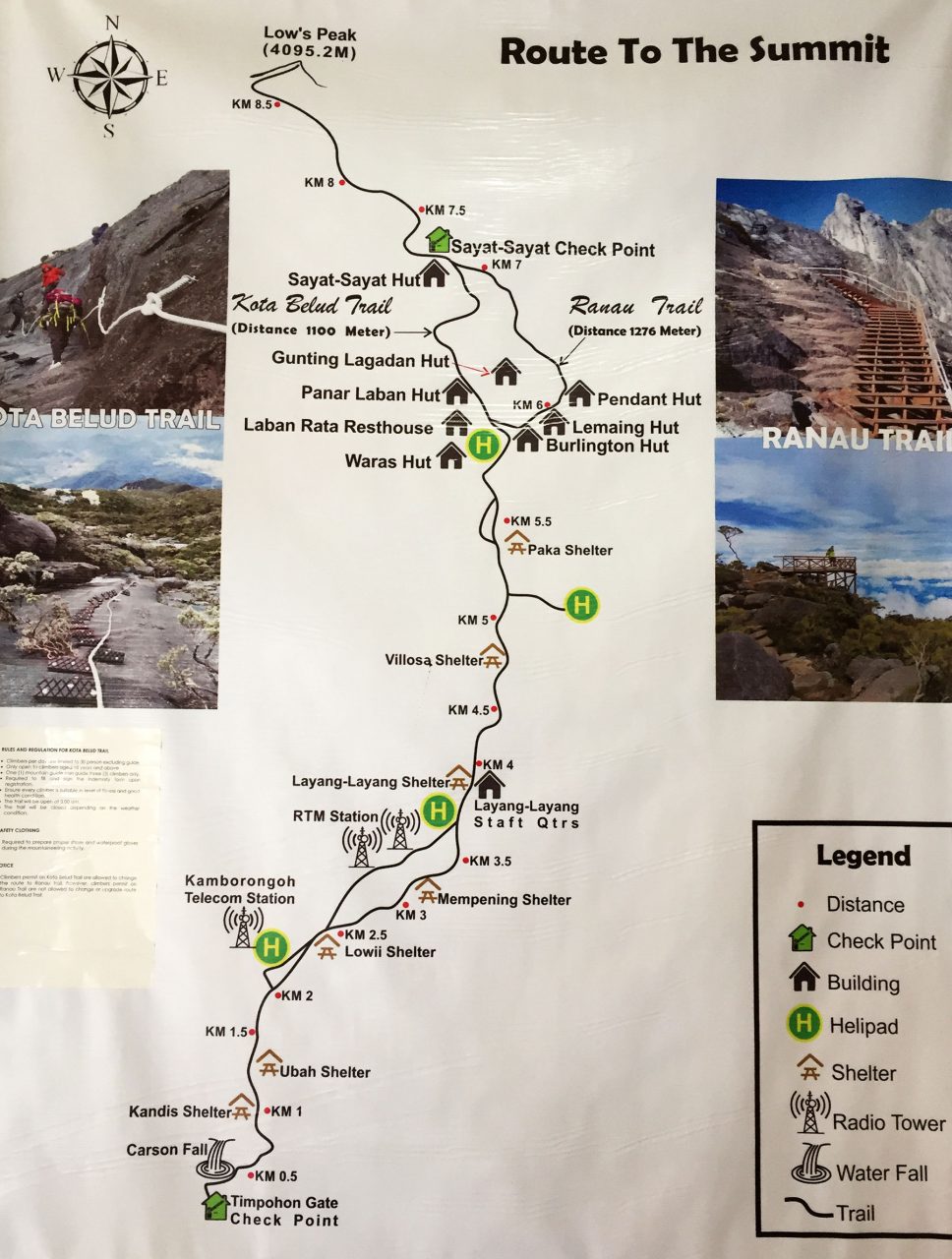
Itinerary of the Climb
Below is a run-down of the 3-day-2-night climbing tour in brief.
Day 1
Check-in to overnight at Kinabalu Park (see location map), which is 88 KM away from Kota Kinabalu (KK). The extra night helps your body to adapt to the height so you will be less vulnerable to Altitude Sickness (acute mountain sickness) in the climb next day. Here is a list of accommodations near Kinabalu Park.
Day 2
9am: Bring your ID card (e.g. MyKad), invoice and QR Code of confirmed booking. Register and pay fees (climb permit, insurance, guide, etc.) by cash to Sabah Parks at Kinabalu Park HQ. Collect your name tag (climb permit) and packed lunch (usually consists of sandwiches, candy bar and a fruit, with a small bottle of drinking water), then meet your guide and porter (if hired). You also can arrange the return transport (by shuttle van) there to transfer you between gate and park for a fee. Be there before 10:30am or they won’t allow you to climb.
9:30am: Transfer to Timpohon Gate, the starting point of the climb.
10am: Start of Climb, after briefing by guide!
4pm: Reach Panalaban after 6 KM. Usually it takes 6 to 8 hours, depend on your fitness.
– Dinner buffet at Laban Rata Rest House (closed by 7:30pm)
– Overnight at the rest house or hostels of Panalaban
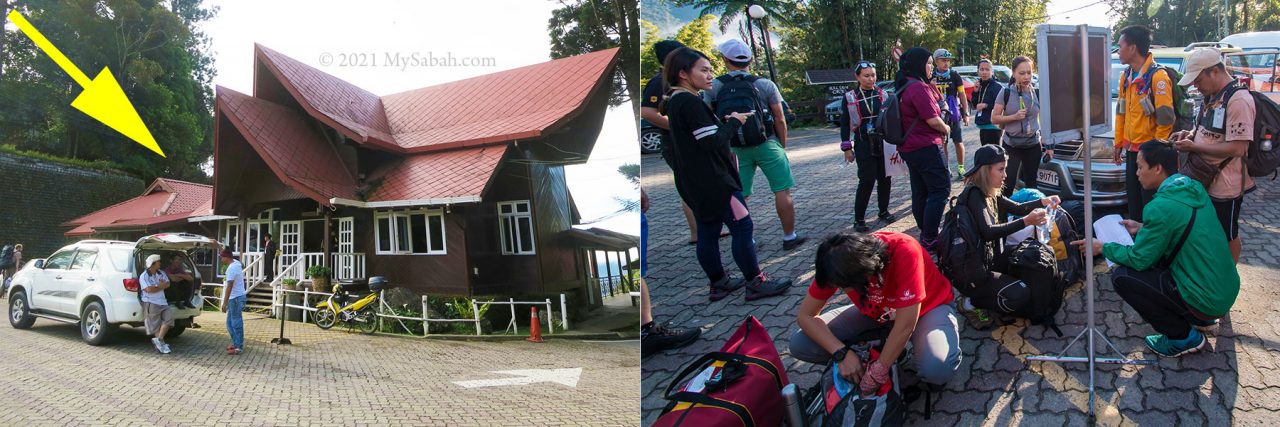
Day 3
2am: Gather and having breakfast at Laban Rata Rest House, then head to the summit (2.75 KM one way).
(The park may not allow you to climb in bad weather)
6am: Reaching the summit (Low’s Peak) of Mount Kinabalu
7am: Descending to Panalaban
10am: Check-out and descend to Kinabalu Park
2:00pm: Back to Kota Kinabalu City
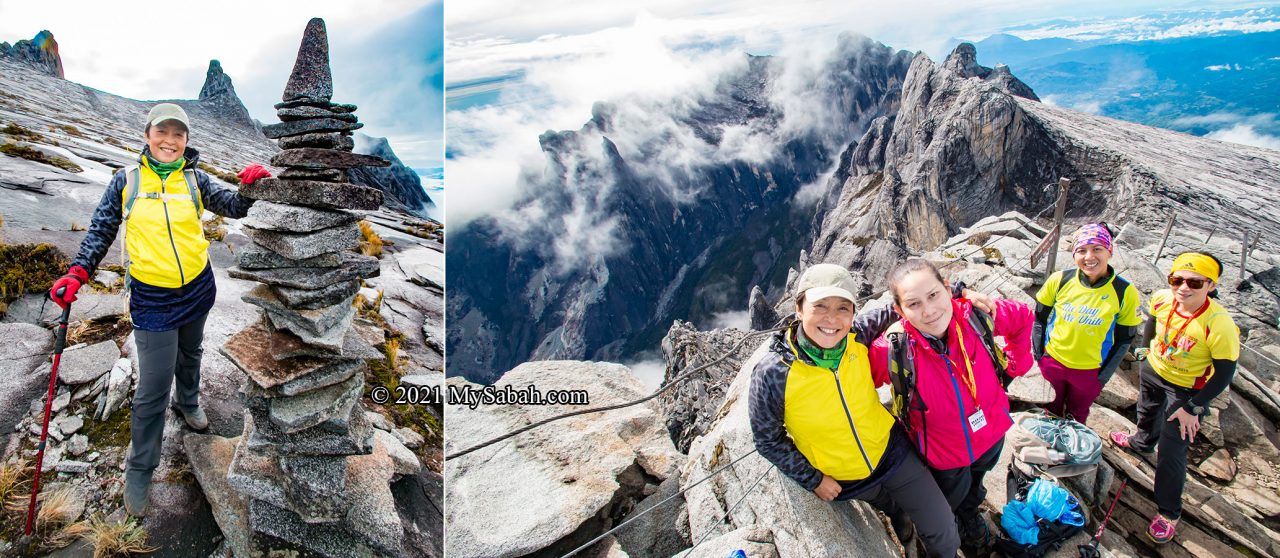
Photo Walk-through
Below are the photo walk-through of the 2-day climb in chronological order. Standard climb will use the Ranau summit trail (open on 1 Dec 2015). Note: The starting point is in Kinabalu Park, not Ranau town! Or you can watch the video below:
Day 1: Climbing to Panalaban
The standard trail starts from the Timpohon Gate (1,800m / 5,906 ft) which is about 4 KM away from the Kinabalu Park Headquarters. The climb from Timpohon Gate to Panalaban (Laban Rata) normally takes 6 to 8 hours (for 6 KM). You can buy basic supply such as snacks, drink and raincoat in the small shop inside the building.
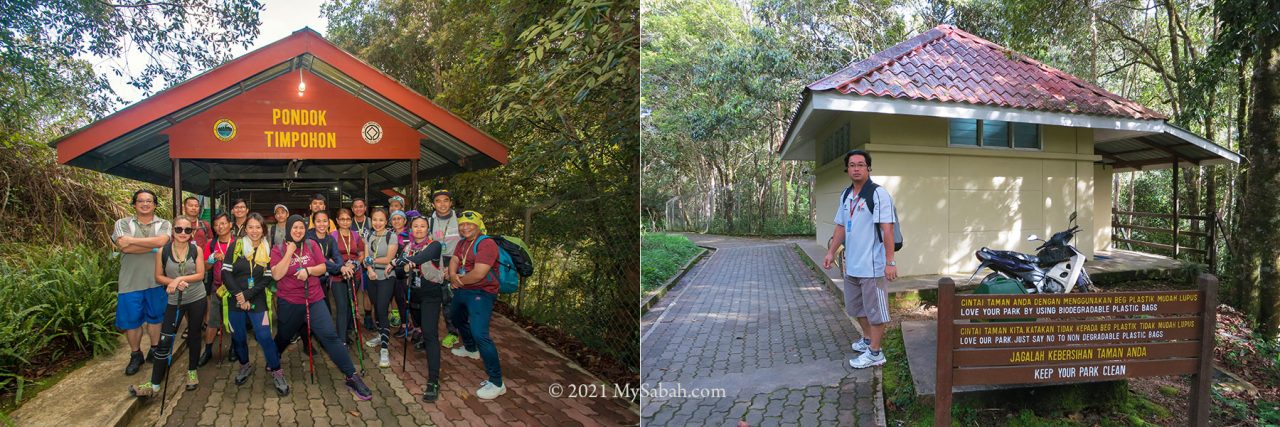
There is a signage or trail marker every 0.5 or 1 KM to show you how far you climb. Use them to motivate yourself.
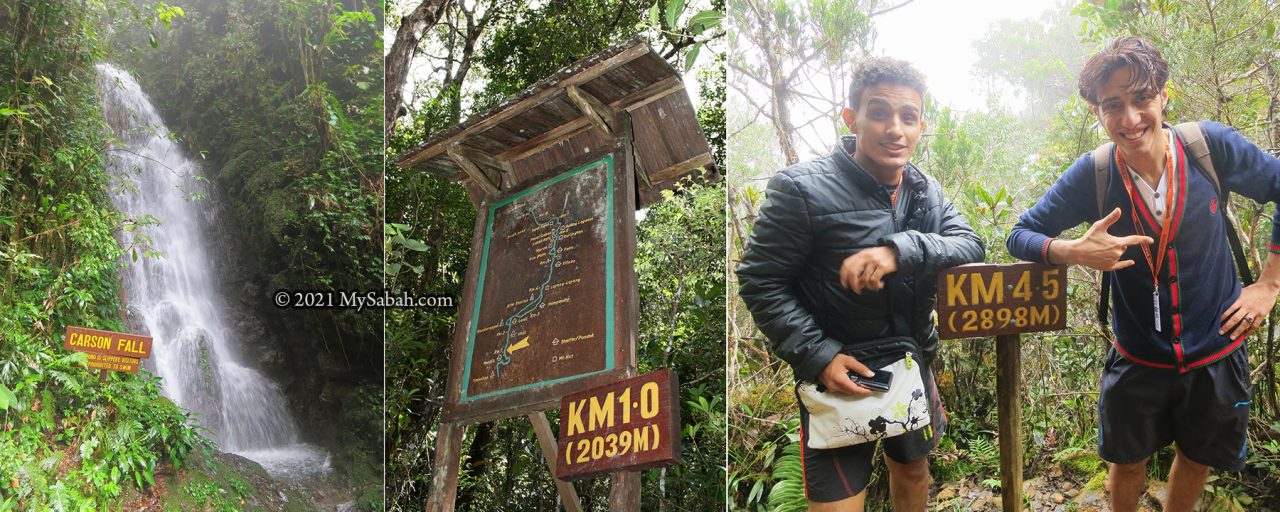
Before reaching Panalaban (3,273m / 10,738 ft above sea level), climbers can stop and rest at seven shelters (pondok) along the way — Pondok Kandis, Pondok Ubah, Pondok Lowii, Pondok Mempening, Layang-Layang, Pondok Villosa, and Pondok Paka.

There is a shelter every 1 KM, where you can take a break, refill water (untreated spring water), use the toilet and dump your trash. Around noon time, most climbers are half-way up there and have their lunch at Mempening or Layang-Layang Shelter. The cute and friendly Bornean Mountain Ground Squirrel (Dremomys everetti) would approach you for food. Please don’t feed them!
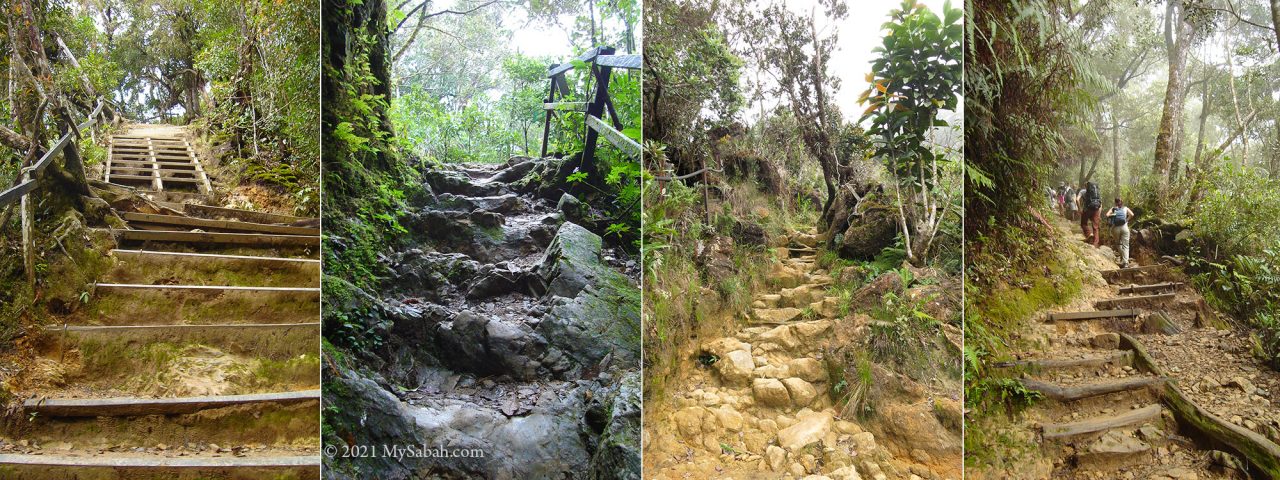
The 6-Kilometre trail to Panalaban is clear and in moderate steepness most of the time. All steep sections have support such as hand rail and stairway. You will feel more like walking on endless staircase than climbing. Just go slow and enjoy the scenic view. As you move higher, you can feel the drop of temperature and the surrounding is getting more and more foggy. The ground is covered with green mosses and many trees and shrubs have epiphytes and lichens on them. What you experience is a walk in the cloud forest (montane forest), which grows above 1,800 Metres above sea level.
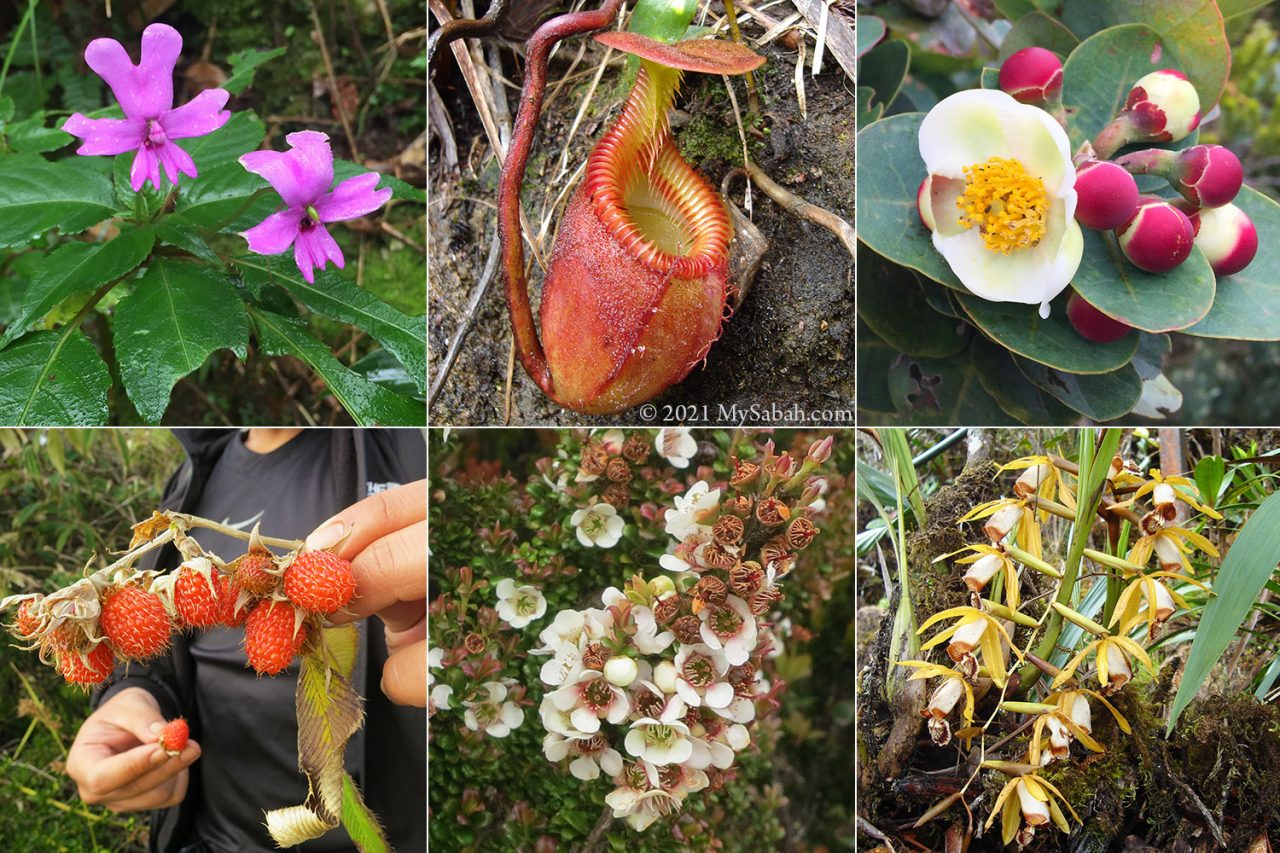
Along the trails, be sure to keep your eyes open for the plenteous interesting vegetation to check out. The unique ecology is what makes Kinabalu Park the UNESCO World Heritage Site, not just the Mt. Kinabalu. Kinabalu Park has the highest density of orchid species in the world. Climbers could spot blooming orchid and rhododendron next to the trail. After 4 KM, pay attention to your left and look for the big and bright-color Nepenthes villosa pitcher plant in the shrubs. This species is endemic to Kinabalu Park of Sabah.
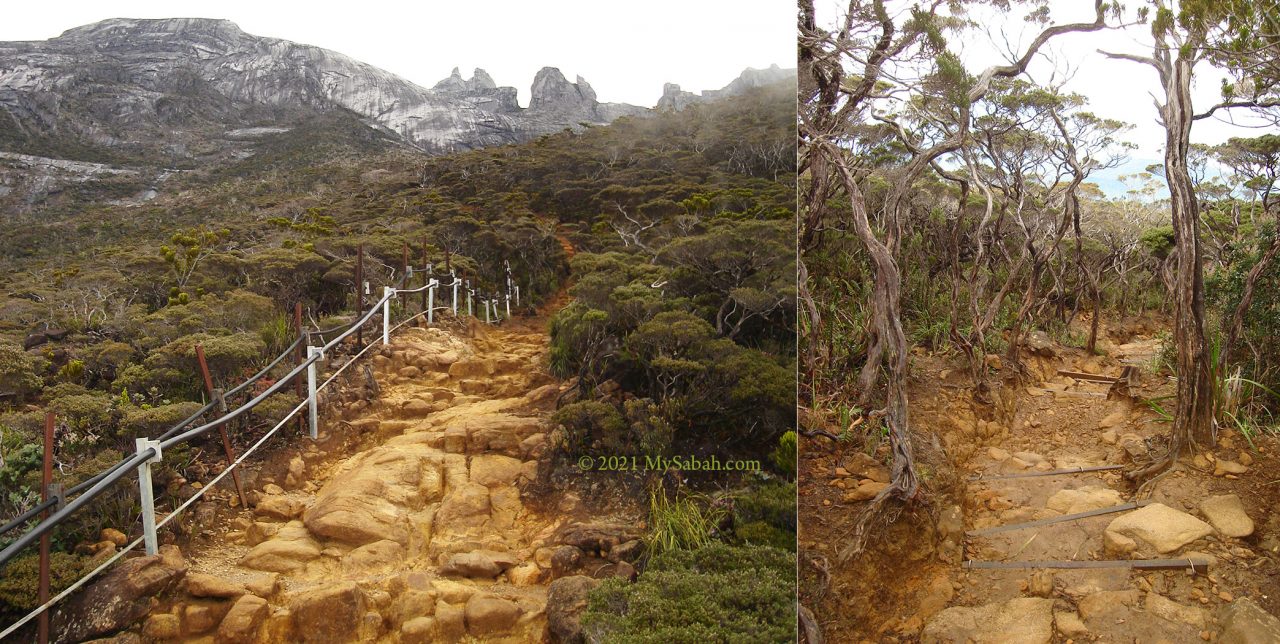
Between 4 and 5 KM is a long section of trail in yellow colour. These yellowish rocks are 40-million-year-old ultrabasic or ultramafic rocks. This area is dominated by dwarf and crooked trees (Leptospermum recurvum), some are over a hundred years old. This tree is one of the few plant that can adapt to the toxic ultrabasic soil.
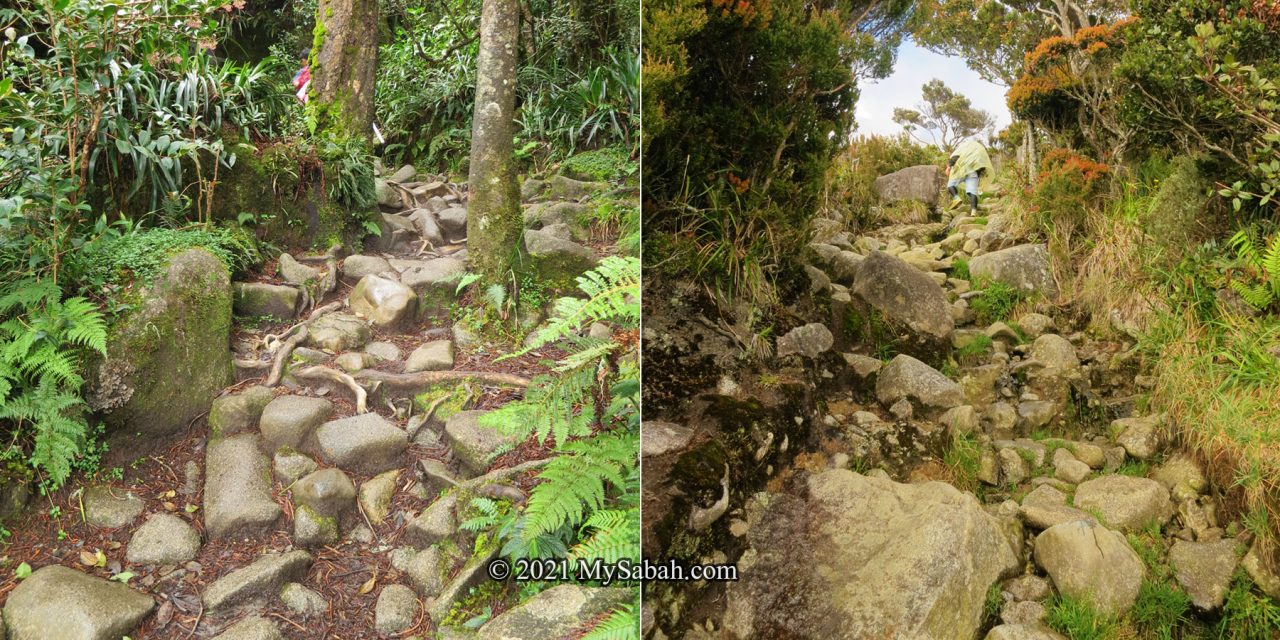
When you see many big dark-grey boulders on the trail, congratulations! Though Panalaban is only a Kilometre away now, the trail is quite steep from now on. These boulders are slippery after rain so watch your steps. A walking pole will help you to balance.
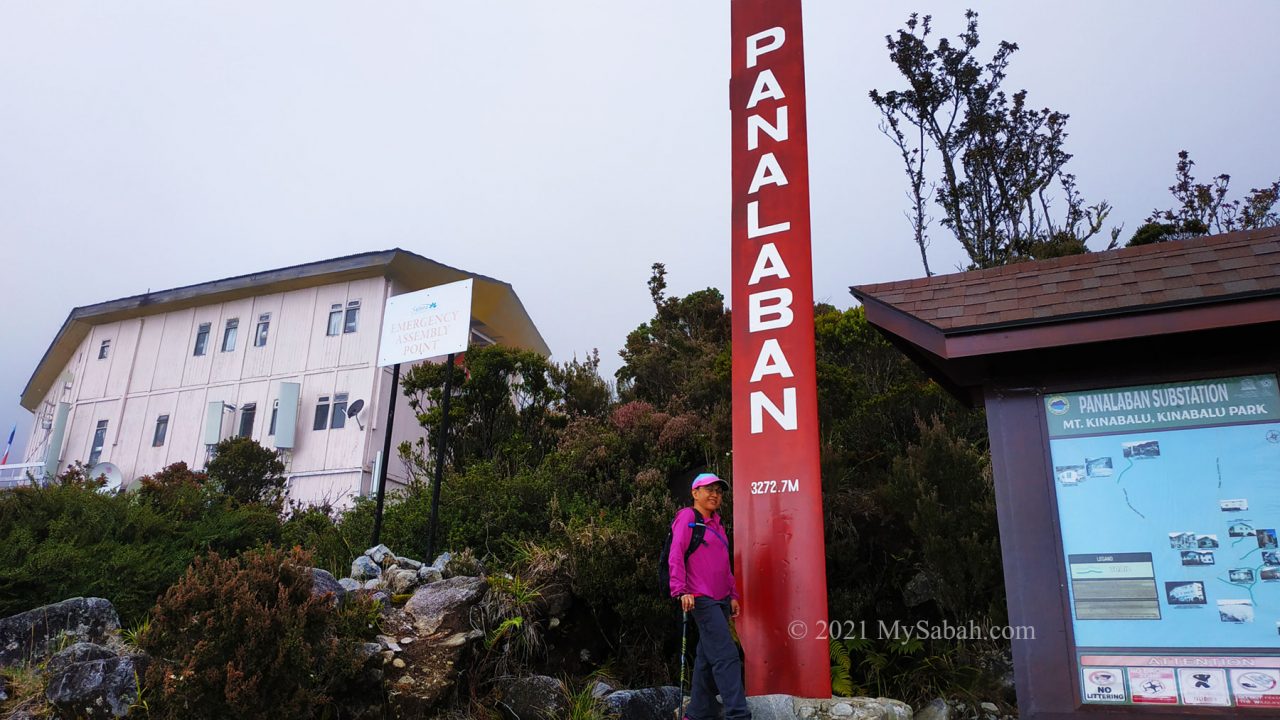
Hooray! You are now 3,272 metres above sea level. This is the place where climbers spend a night. The restaurant of Laban Rata Resthouse is where you claim your warm buffet meals. You better reach Panalaban before the restaurant closes at 7:30pm. Ala carte meals are available too.
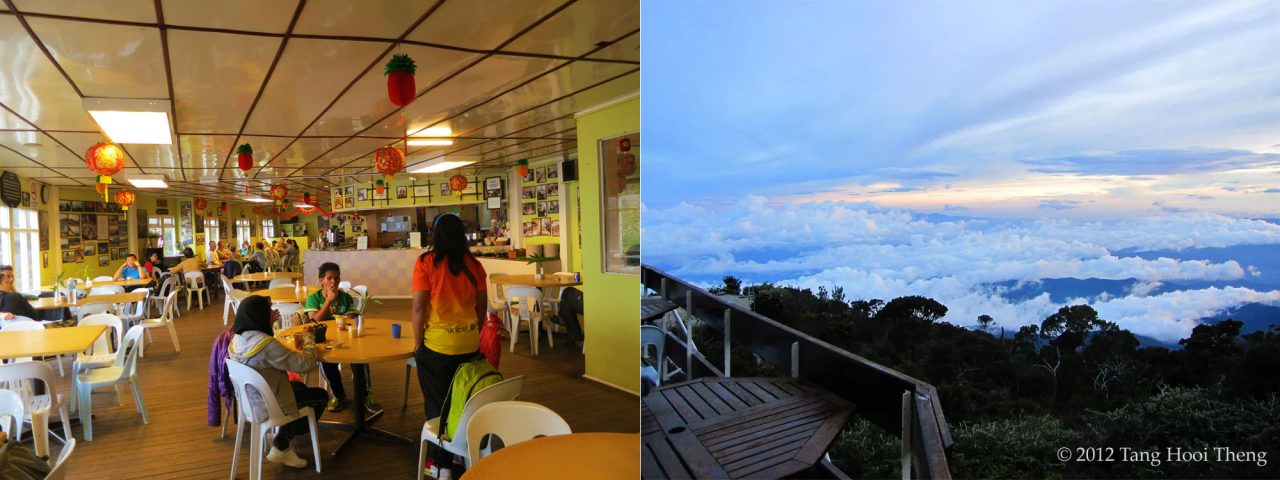
The scenery at Panalaban is fantastic! Just enjoy the view with a cup of coffee at the balcony, and look at the dense cloud under your feet. The sunset view at Panalaban is one of the best in Sabah. There is a small shop in the restaurant that sells items such as snacks, instant noodle, drink, poncho, medicines, postcards, etc. but at a higher price.
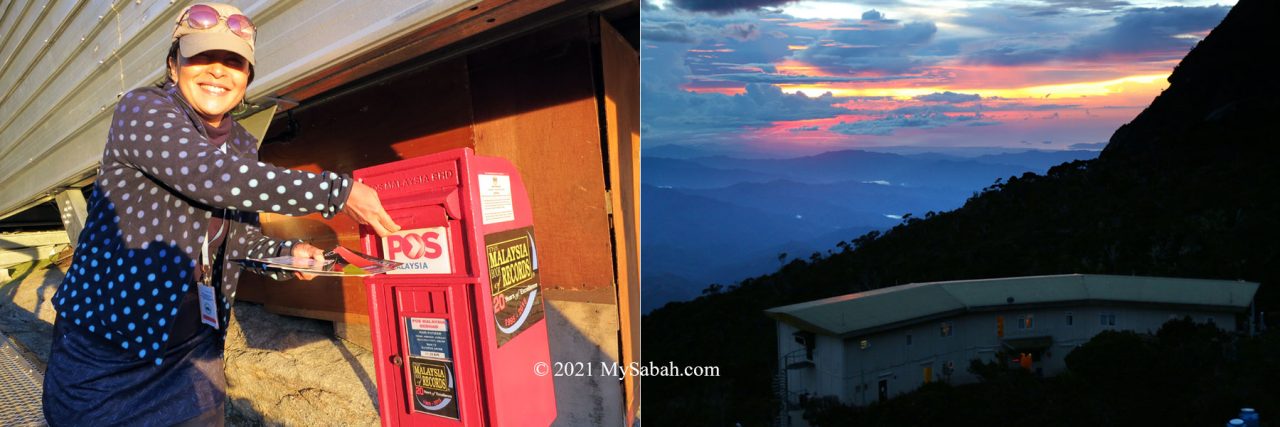
FYI, you can send postcard from the highest post box of Malaysia, which is located next to Pendant Hut in Panalaban. There are overnight accommodations provided for climbers on the mountain (Laban Rata Rest House, Waras Hut, Lemaing Hostel and Panalaban Hostels). The rooms are humbly decorated but are comfortably equipped thick blankets, bunk beds, as well as clean drinking water.
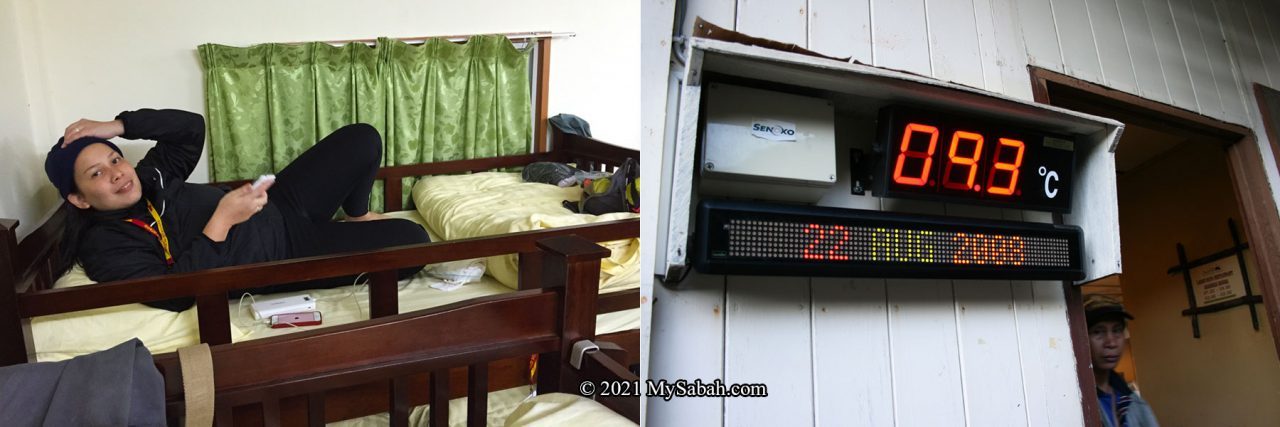
The temperature at Panalaban can drop below 10°C (50°F) and a windy day makes it worse. Except some premium rooms in Laban Rata Resthouse, most rooms don’t have any heater. The water heater doesn’t always work. Tell you a secret. Many climbers skip shower because it’s too cold.
Good Night! Sleep earlier because you need to wake up very early next day.
“Though perhaps not the highest mountain in the world, it is of immense height” (captain Alexander Dalrymple, 1769)
Please note this walk-through only covers the standard summit trail named Ranau Trail. If you want to know more about another new summit trail, which is more challenging, please read this page about Kota Belud Trail.
Day 2: Conquering Mount Kinabalu
The climb to the summit resumes at 2am the next morning. The climb from Panalaban to the summit is about 2.72 KM and normally takes 4 to 5 hours. To cut down weight, you can leave the unnecessary stuffs in your room. There is no water point on the way (except Sayat-Sayat checkpoint). Carrying 1 Litre of water is quite enough as you won’t feel really thirsty under cold temperature. You also need torchlight (or LED headlamp), warm clothing and poncho.
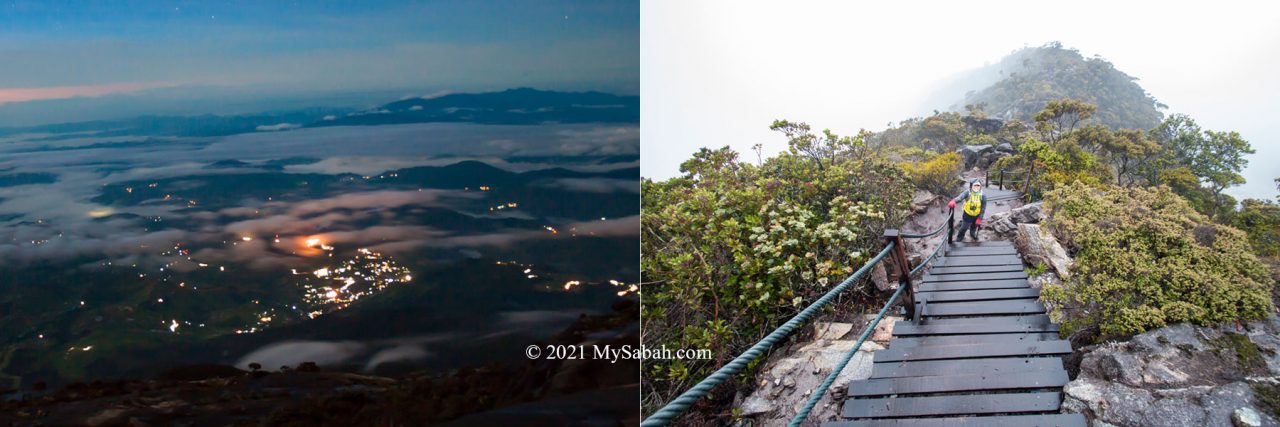
After briefing by your mountain guide, the ascend will start with nearly two hours of steep staircase climbing in the dark. The only way is up. You can see long line of torchlight of other climbers. You will be tired, stop and gasping for air for many times. Without air and light pollution, the sky is full of stars, a beautiful view you will never forget.
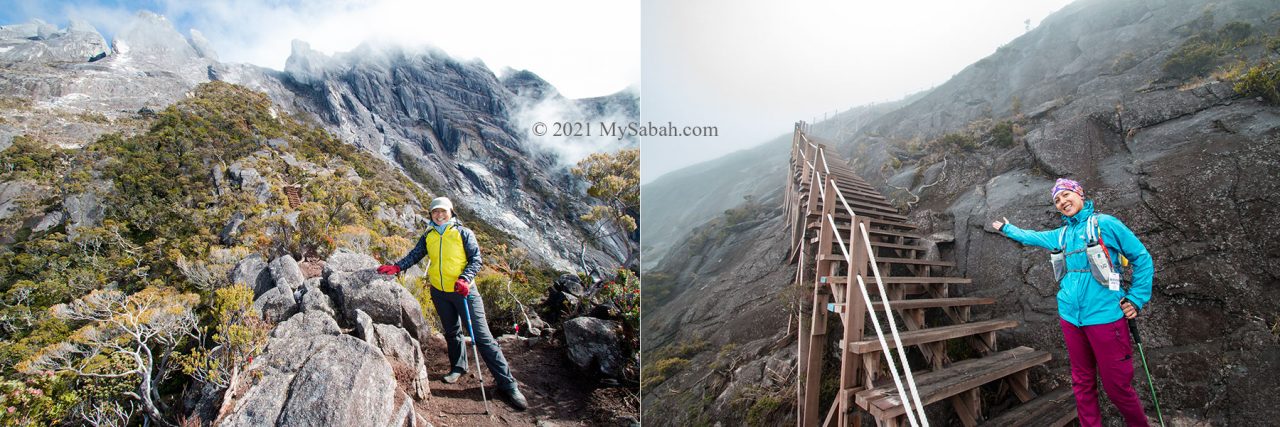
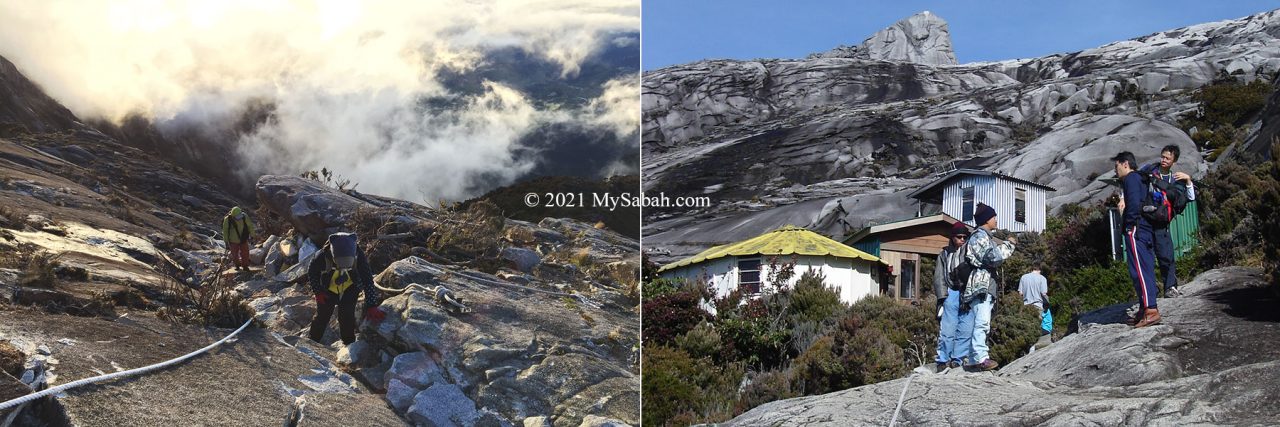
Then you will come to the rope section, the most challenging part that requires you to hold onto a rope to move up for a few hundreds metres. Soon you will be happy to see the Sayat-Sayat checkpoint. Climbers can rest there for a while and use the last toilet on the mountain trail.
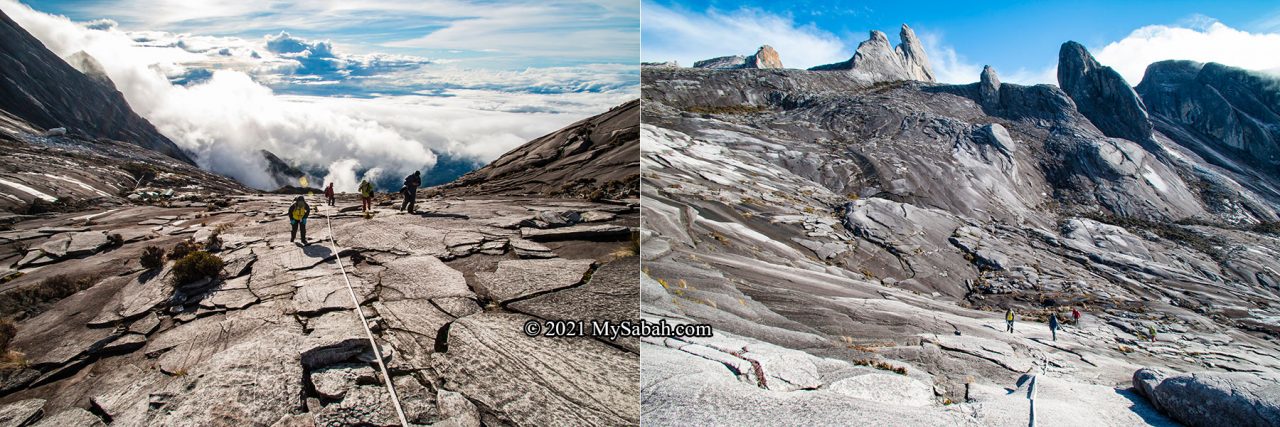
After Sayat-Sayat, the trail will be mainly rock surface with 15 to 20 degrees of inclination. The dense vegetation is replaced by scarce summit plant on the bald granite ground.
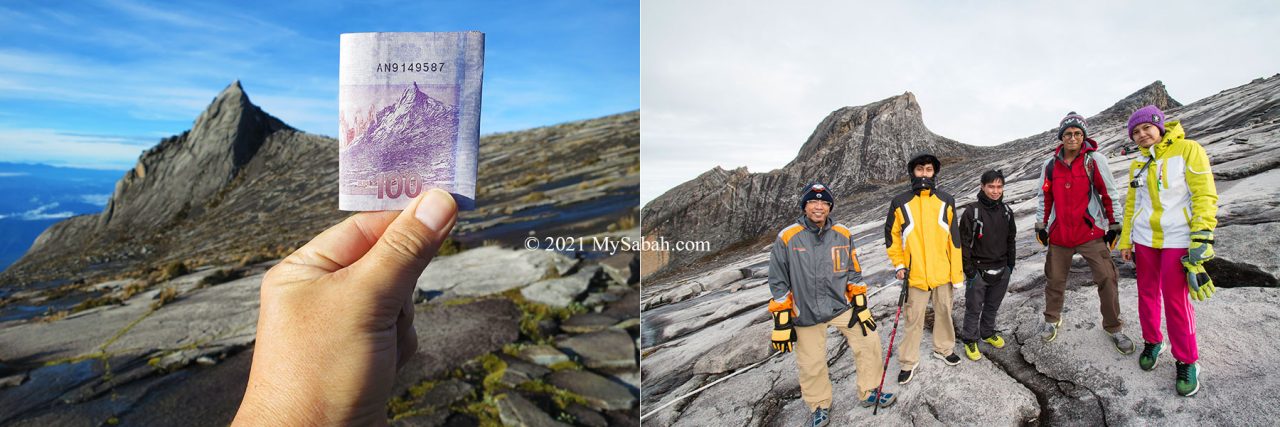
Anyway, the scenery just gets better at this point. In fact, it’s one of the most beautiful places in Malaysia. You are like wandering in another planet and admire the jagged peaks around you. The most photogenic peaks are the Donkey Ears Peak and South Peak.
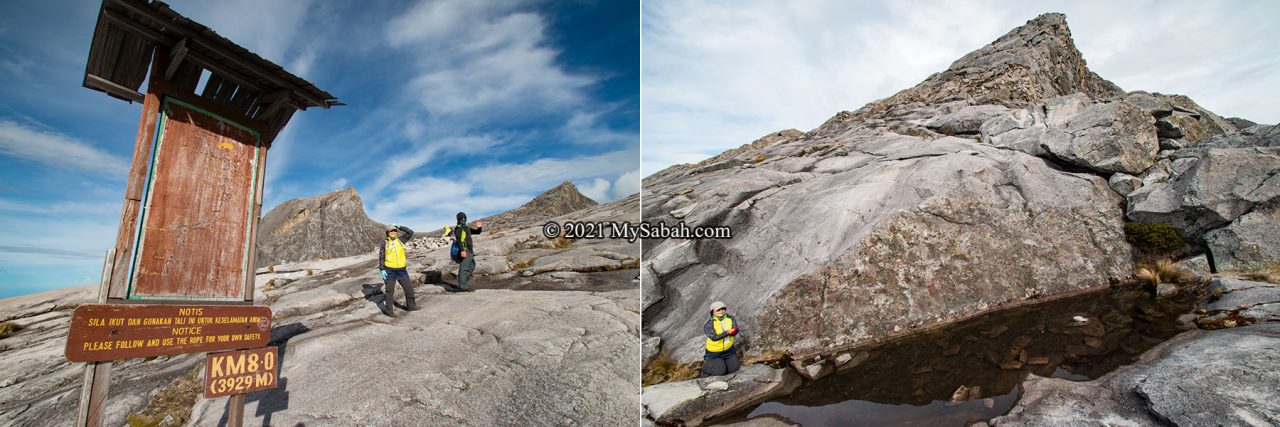
The air on the mountain is 20% thinner near the top of Mount Kinabalu. You will feel that your body is heavy and every move takes a lot of energy. Due to exhaustion, nine out of ten climbers would start to curse and say “why am I doing here?”. Though they complain, after the climb they will miss this mountain and come back again lol.
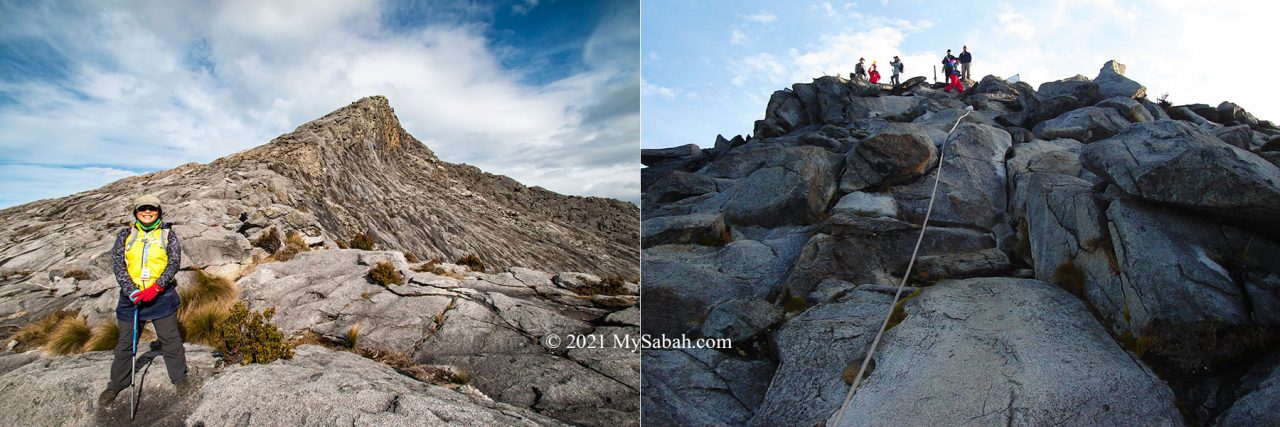
After the 8 KM signage, the summit on Low’s Peak is less than a Kilometre away. Your goal is simple, just keep moving slowly in steady pace. The last two hundreds of rope climbing to this highest peak will drain your last energy reserve. The sweet reward is reserved to those who persist. Conquering Mount Kinabalu is once in a lifetime experience and must be in your bucket list.
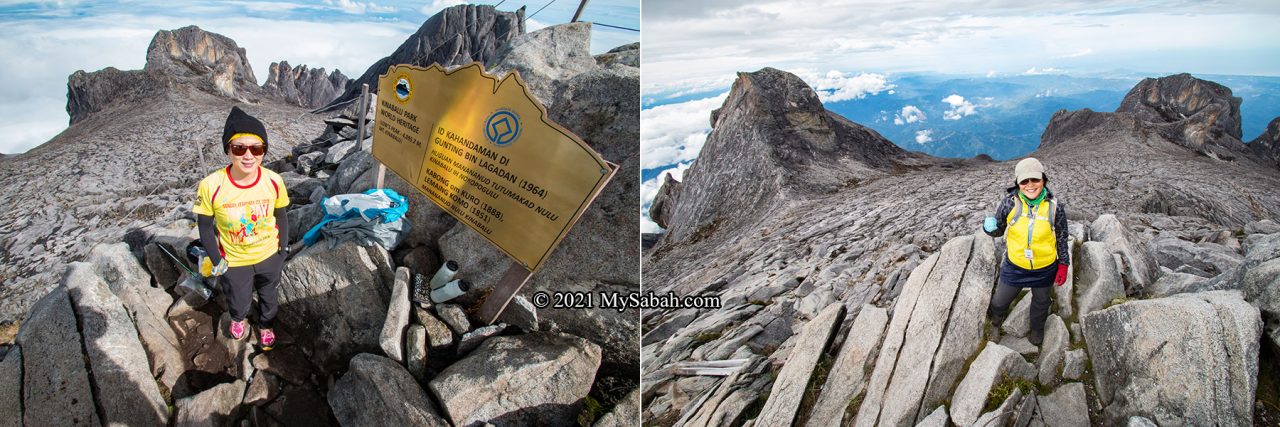
About 50,000 climbers leaves their footsteps on Mount Kinabalu annually. Despite the struggle, none of them shows the face of regret on the top. You have only an hour to enjoy the moment of your sweet victory, because the guide will ask you to leave the summit before 8am, before the mountain covered in dense fog (poor visibility).
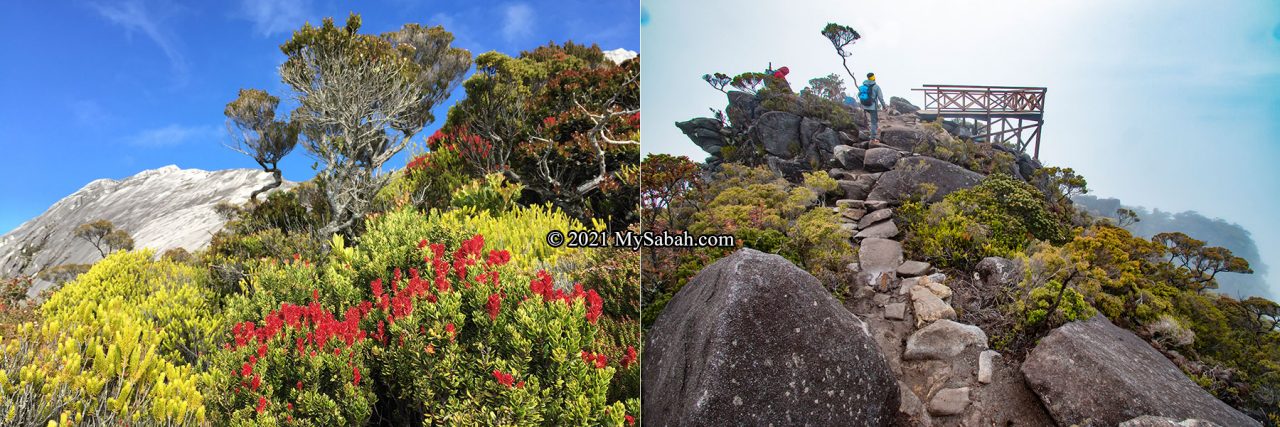
When you hike back to your hostel in Panalaban, do slow down a bit to appreciate the unique plant and flowers during the descend. Without daylight in night climb, you didn’t realise that you were surrounded by the most valuable eco-treasures of Borneo.
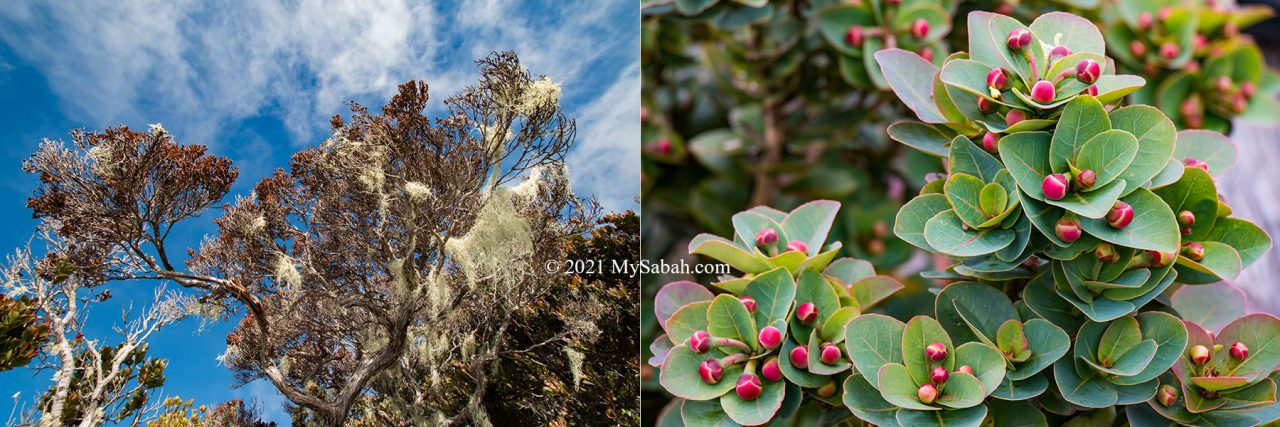
Lastly, don’t forget to collect your certificate (for a fee) at Kinabalu Park office as a proof of your successful climb.

Tips and Advice
- Pack Light. Don’t carry more than 6 Kg of weight for the climb. Those bringing huge backpacks can hire a porter (for a fee) to reduce the burden. Your porter will head straight to Panalaban in great speed and won’t be walking next to the slow you, so do not let them carry your water and raincoat.
- The climate is cool with an average temperature range of 15°C to 24°C (59°F to 75°F) at the Kinabalu Park Headquarters and 6°C to 10°C (42°F to 50°F) on the mountain. It can even go down to freezing point in coldest months (Nov-Dec). Climbers are recommended to wear breathable cotton clothing and comfortable pair of hiking shoes.
- Climbers are also reminded to be ready with torch lights, raincoats and warm clothes in case it rains and the temperature drops.
- Descending stresses your knee and muscle more than ascending. Try to descend slowly to avoid serious joint and muscle pain later.
- Trail can be slippery after rain. Wear comfortable trekking or hiking shoes with good grip (best if it’s waterproof).
- Stay with your group and Mountain Guide at all times. Never walk off trail.
- Don’t climb if you have ailments such as asthma, hypertension, diabetes, heart disease and other sickness that severely affects your fitness.
- Always book the tour with licensed tour agent. There have been many cases tourists cheated by unlicensed agents.
- Mt. Kinabalu is the Sacred Mountain (resting place of the deceased) of Sabah. Please be respectful and refrain from doing anything offensive such as taking nude photo.
- Follow the social media of Sabah Parks for latest update on travel restriction. Currently, only our locals can climb the mountain.
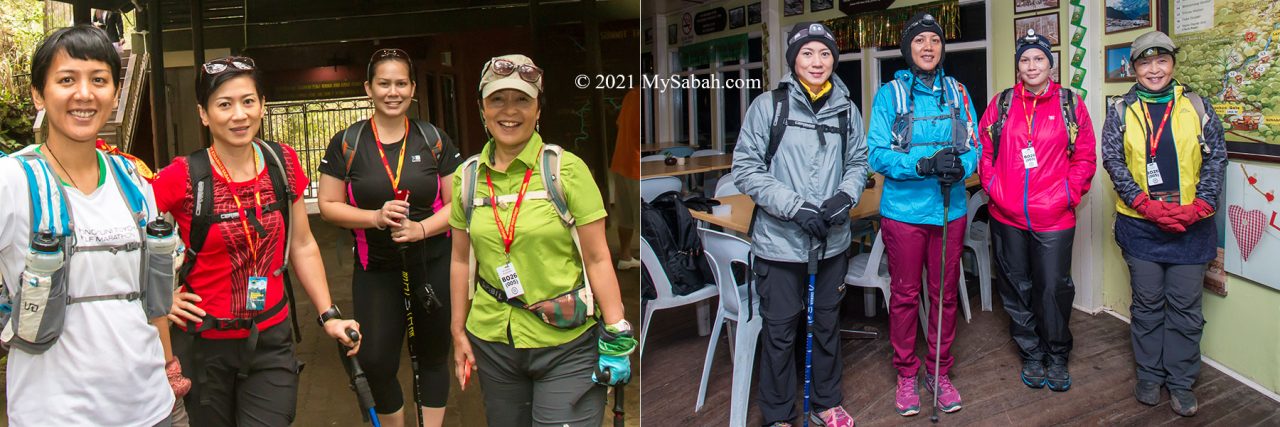
Things to Bring
- Passport / MyKad (for registration)
- Proof of Accommodation Booking and Payment
- Cash (most transactions are by cash)
- Drinking Water (in Refillable 1 Litre water bottle)
- LED Headlamp (head torch)
- Energy Bars / Chocolate Bars
- Light Backpack (preferably with rain cover)
- Raincoat / Poncho (Murphy’s Law says it’ll rain if you don’t bring one)
- Toiletries (e.g. toilet paper, soap, toothbrush, toothpaste)
- Warm Clothing (e.g. Wind breaker, Fleece, Jacket)
- Extra clothing and socks
- Gloves (to keep warm and rope climbing)
- Ear Warmer
- Towel
- Camera and spare Battery
- Medication such as painkiller, headache or altitude sickness tablet
- Plastic bags: to store rubbish and soiled clothes
- Optional: walking pole, sunblock lotion, sunglasses, portable charger
I hope you find this guide useful. Please feel free to comment or ask any question in the Comment section below.
Photos taken in Kinabalu Park and Mount Kinabalu, Sabah, Malaysia Borneo
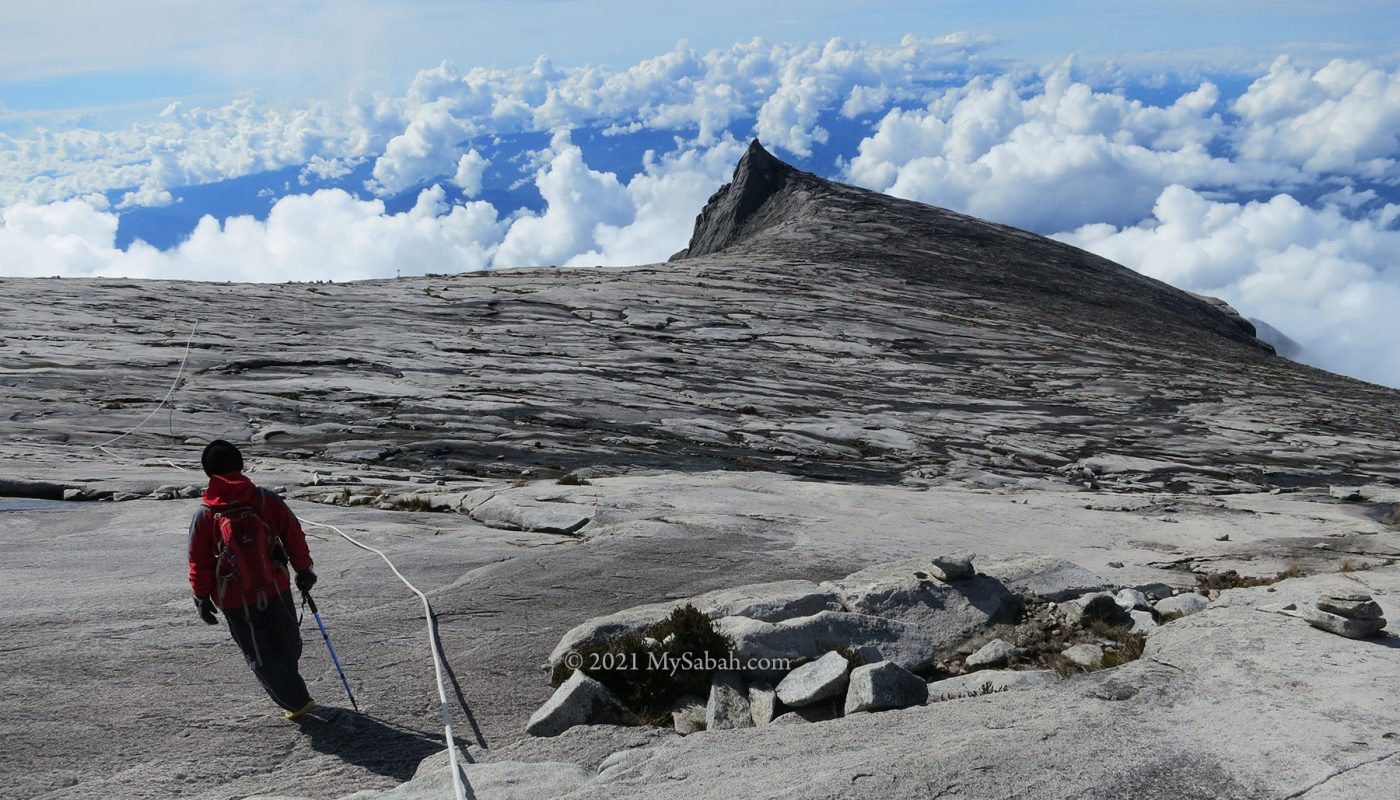

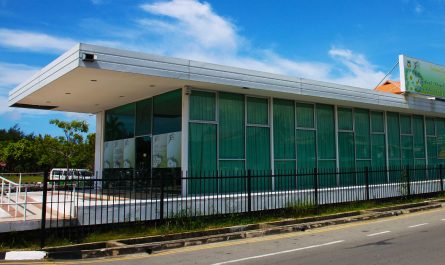
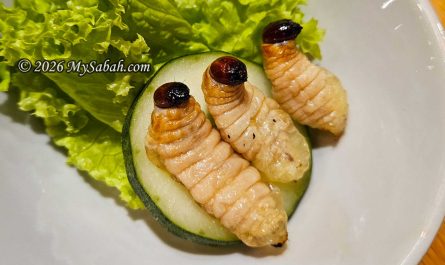
smokehead, i think i recognise 2 of your ‘the way’ one is KK bird santuary, the other is the steps up to mount K. what are the other 3 ‘ways’?
🙂
Top row:
left: Sepilok Orang Utan Sanctuary
centre: Monsopiad Village
right: Mount Kinabalu
Bottom row:
left: KK City Bird Sanctuary
right: Sepilok Jungle Resort
where is kk bird sanctuary? i only saw the sign board only?
anthony, if u go to Likas Square from Sport Complex, you will see the KK City Bird Sanctuary sign at the left, before the traffic light. just turn left at the sign and go straight about 100 m and u will see the office and the park. fyi, it is close on every Monday.
Hello Smoke Head,
such a beautiful place to visit. I’m tired of the so commercialize places like jamaica,aruba and so on here in the Carebian. I love to go on my own and being an American young woman, what do you thing of my safety at this time in Sabah. I heard so much nagetive as far as the Foreigners Security in Sabah in particular. Ur pics are so beautifully taken, its so alive to me, tell me about the birds flu too, I never been to any asian countries and want to make Sabah being the first in my list. Really good jobs on this site. dont email me, its office email just publish here thanks
marie, it is quite safe to travel in sabah. well, crime is something happen in every country. as long as u r cautious (e.g. don’t walk at night at quiet place alone), u will have a good time here. as a matter of fact, sabah is even safer than the countries who issued warning about the safety in sabah. there was/is no bird flu and SARS case here. welcome to sabah.
Another excellent guide. Well done!
Thanks LHS. My blog won’t be complete without a guide to climb Mt. KInabalu. 🙂 Let’s see how much Google appreciates the info and hope this article won’t be buried under tons of useless links.
Thanks for this very useful post! I just got back from a few days in Sabah, and was thinking of doing this climb sometime this year. Perhaps you can also post a list of suitable clothing/shoes/gear?
You are welcome Caro. You may wear any comfortable clothing such as fleece & jacket that can keep you warm around 5 degree Celsius. It is better if it comes with hood, as the mountain can be windy. For other stuffs, please check out the Things to Bring section.
OMG….y condom?!
Haha, it’s just a joke. Funny thing will happen if someone just copy & paste the list without reading it carefully. 😀
Really good post! My friend(non-sabahan) went climbing in 2011 and book through SSL, it was only Rm590 for 2 pax, 3D2N. Why did the price raised so high?
Thanks Wewe. 🙂 I include other cost such as transport, mountain guide, permit, etc., so the fee looks higher.
Video of my one day hike. Feel free to contact for any questions! 🙂 https://www.youtube.com/watch?v=bVVAM_Pax5o
Hi D�nes, I’m so impressed. What time did you reach the summit?
Hi Murphy! Thank you, around 12:10PM
Hi! Long time for response, sorry 🙂 I reached the summit around 12.15
12.30
wow 🙂
May I know which travel agents that offer the rate that is shown? Any recommendation? Thanks.
You may try: http://www.amazing-borneo.com/tours/mount-kinabalu-packages-1.html
thank you very much. Your site have help me alot
You are welcome Reen 🙂
Very informative site. Attempted Mt Kinabalu three times and only reached the summit once in 2011. I was breathless after Sayat Sayat Hut. Considering climbing again in Jun next year. Can I take the challenge again?
You should, Choo. I’m never tired of its beautiful view and still climbing it whenever possible. 🙂
A very informative post! Thanks 🙂
You are welcome Divya 🙂
email to info@exotic-adventure.com for the best rates
Very informative. Will be in KK this January 2014. Can we go for lower ground only say Lowii shelter?
Hi Hamidon, yes you can. I was told that we can register at the gate and hike up to Layang-Layang Hut (at 4th KM). You only need to pay RM$5 for the visitor pass.
Hi, Tadpole. can u please advise if you can help to advise what to see for 8days stay in KK best? I have some things i want to look over but need somebody’s advise. My mails is zilevitch@mail.ru and skype is tsarana. if you could contact me there – would be really great!
Sure Anna, you may e-mail me at me@mysabah.com. I’ll try my best to answer your question.
What a truly fantastic, non bias, clear & precise article.
Thank you so much Nova for it possible for me to plan as “perfectly” and “unpainfully” as I could.
Bravo.
Thank you too for your kind comment, Ivy. Nova will be very happy to hear this. ^_^
PLEASE UPDATE PRICE FOR CLIMBING.
Thanks for the reminder. I’ll visit their office soon to check for the latest rate.
I’ve updated the price (of year 2014)
Thank you so much for the informative post. Thanks to your post I could book a slot at Lemaing Hut after the damn Laban Rata screwed me over 🙂
No problem Emily. I’m so glad you make it ^_^
Hi! Thanks for this resourceful website. It is really helpful. Could you please advise if I do not take a package from a travel agency but want to organise myself, how can I find a guide and will it be cumbersome? Apart from this, is there anything that will have hassles.. like getting permits etc? I mean can I do it on the same day of climb easily or should I do it in advance.Thanks a lot.
Climbers usually register at Kinabalu Park HQ in the morning on the climbing day. You buy for the permit and insurance, sign the indemnity form, and collect your tag there. It’s also the same place where you can hire a guide or porter. The registration and payment normally take less than 30 min. If you have booked the accommodation in advance, you would have no problem getting a permit (tag) on the spot.
amazing
Hello ! Thank you for this very ressourceful website ! We just need some extra informations fot the 2D/1N experience to be sure. We don’t want to take a full package with an agency, so if I get it right, the best is to book a room in Laban Rata with Sutera Sanctuary Lodges. But will it assure us to have a permit and a guide for climbing on the Dday ? Do we have to wait 30 days before booking ?
Thank you so much for your answer !!
You are welcome M�lina. 🙂 If you are a Malaysian, another option is to book with Sabah Parks anytime for a room in Lemaing Hostel, an accommodation next to Laban Rata. Once you have booked the room, you can pay permit and hire guide and porters at their Kinabalu Park HQ.
Nice and big article, I wrote about our bit cheaper climbing here: http://the-ollie.com/2015/10/07/what-is-the-cheapest-way-to-climb-kinabalu/ Kind regards! 🙂
Thank you Ollie for sharing. 🙂 Just to let you know that your climb is in 2014, and there are some changes after the earthquake in Jun 2015. 1) The guide and permit fees have increased, 2) Mesilau Trail is closed indefinitely, and 3) The route from Laban Rata to the summit is changed.
Hi Murphy 🙂 I climbed month before earthquake in 2015 and I checked what changed before wrinting so I knew about it, even before earthquake prices changed a bit… But good you wrote here about it ’cause it is important 🙂 Best regards! 🙂
I see. It’s great that you take note of the new changes. Cheers! 🙂
Thank you. You have provided very useful information and details. Looks like booking through an agent is the best bet.
You are welcome Palani ????
LoL at the strikedout condom
Thanks for noticing that ????
Hi, I’m Muhammad Budi from Indonesia, My friends and I will go to Kota Kinabalu on July 12, 2016 and climb to Kinabalu Mountain on July 14, 2016. We plan to stay at Lemaing Hut and we need to book Lemaing Hut from now so that we get the room at that time. So, how is the way to book Lemaing Hut for 3 persons. And, How is about the Guide? Do we need to book the guide from now too or we can book the guide when we have arrived at there?
Thanks
Thanks for the detailed information on this post.
Is there any additional note for Lows Peak Route?
Are there lockers or a secure place to store personal items not needed for the climb?
I’ve been climbing Mount Kinabalu since 1999 and will be come back again for my personal ’11th’ climb trip to the peak. I really enjoy being up there. It was a different feeling, every time.
Found good tips here. Really useful for my preparation to climb on 14 Aug 2022. I didn’t book through agency. With the info from this blog, I booked directly from Sabah Park. They have live chat now to clarify things. Very convenient.
I’m glad that my tips help. Fortunately things are getting easier nowadays, for example, we can research and book the tour online.
I heard that climbing Mt. Kinabalu requires a great physical strength! Good luck!
You can feel the temperature dropping as you ascend, and the air becomes increasingly hazy.
I spend a total amount $200 hiking Mt. Kinabalu. My foods and souvenirs inlcuded.